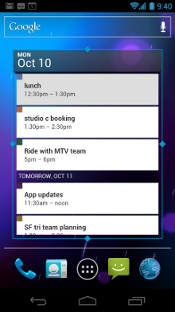Google releases Android 4.0 source — and Honeycomb too
Nov 15, 2011 — by Eric Brown — from the LinuxDevices Archive — 2 viewsGoogle released Android 4.0.1 (“Ice Cream Sandwich”) code to open source, along with the Android 3.x (“Honeycomb”) code that it has kept under wraps since it arrived on Android tablets earlier this year. The release follows the Nov. 11 introduction of Android native development kit (NDK) v7, which has been upgraded for Android 4.0 with two new multimedia API sets.
 On Nov. 14, Google released source code for Android 4.01 ("Ice Cream Sandwich"), keeping a promise it made shortly after announcing Android 4.0 (pictured) on Oct. 19.
On Nov. 14, Google released source code for Android 4.01 ("Ice Cream Sandwich"), keeping a promise it made shortly after announcing Android 4.0 (pictured) on Oct. 19.
The release also includes the full Android 3.x ("Honeycomb") source code. Google had declined to release that earlier this year as it sought to improve the initially buggy mobile operating system. Open source advocates, meanwhile, held up this refusal as a sign that Android was becoming more proprietary.
In his Nov. 14 post announcing the open source release on Google's Android building group site, Jean-Baptiste Queru, a software engineer for Google's Android project, cautioned that the Honeycomb code is incomplete, and asked developers to initially focus on Ice Cream Sandwich (ICS).
Indeed, Google has not tagged the specific components linked to Honeycomb as opposed to ICS, making things more difficult for developers who want to focus on Honeycomb. As Ars Technica's Ryan Paul suggests. this is intended "to discourage third-party developers from creating Honeycomb builds of Android."
Nevertheless, Paul allows that the ICS and Honeycomb releases will be welcomed by the developer community and open source advocates, even if Android is much less open source, than say, the Linux kernel.
"Google's "ability to withhold code for any given release as it sees fit," and the fact that "actual Android development process occurs behind closed doors" means that "changes in governance are still needed to make Android a truly open project," writes Paul.
 A device build target named "full_maguro" in the source tree can be used to build an Android 4.0 system image for the Samsung Galaxy Nexus smartphone (pictured at left), the first phone to receive Android 4.0. The Galaxy Nexus, which features a dual-core, 1.2GHz processor and a 4.65-inch display, is expected to ship with 4G LTE on Verizon Wireless Nov. 21. That is also when Google will complete a 10-day Galaxy Nexus smartphone giveaway, which is linked to a puzzle contest.
A device build target named "full_maguro" in the source tree can be used to build an Android 4.0 system image for the Samsung Galaxy Nexus smartphone (pictured at left), the first phone to receive Android 4.0. The Galaxy Nexus, which features a dual-core, 1.2GHz processor and a 4.65-inch display, is expected to ship with 4G LTE on Verizon Wireless Nov. 21. That is also when Google will complete a 10-day Galaxy Nexus smartphone giveaway, which is linked to a puzzle contest.
Android 4.0 unifies the 2.x smartphone branch and the Android 3.x Honeycomb tablet branch, and borrows the holographic UI design from Honeycomb. The release enables Honeycomb apps to be more easily modified for smaller smartphones and other form factors.  ICS features include software navigation keys and a redesigned keyboard, as well as an "Android Beam" near field communications (NFC) peer-to-peer communications app.
ICS features include software navigation keys and a redesigned keyboard, as well as an "Android Beam" near field communications (NFC) peer-to-peer communications app.
Android 4.0 also offers the ability to unlock phones via facial detection, as shown in image at right. The face unlock feature, however, may need some work. Several reports claim the feature can be fooled by holding up a photo of the user in front of the camera.
Android NDK updated for ICS
The open source ICS release follows Google's Nov. 11 release of revision 7 of the Android native development kit (NDK) to support Android 4.0. Android NDK v7 enables "developers who are using native code to get started with the new native APIs available in Android 4.0," according to the blog announcement by Xavier Ducrohet, Android SDK Tech Lead.
The APIs include a new API set based on Khronos OpenMAX AL 1.0.1, said to provide a direct, efficient path for low-level streaming multimedia. Another API set includes extensions to the existing native audio API based on Khronos OpenSL ES. This is said to let native apps decode compressed audio assets to PCM (pulse code modulation) format.
Google plans Nov. 16 Android announcement
In other Android news, Google has announced a special Android-related event to be held in Los Angeles on Nov. 16. The cryptic announcement is headlined "These Go To Eleven," a phrase used in the rock-music mockumentary This is Spinal Tap, suggesting a music-related announcement.
Availability
Google's source code for Android 4.0.1 is available now for free download on Android's Open-Source Project git servers. Queru noted that because ICS is a larger code push, it will take a awhile to complete the download. Programmers who sync before the download is complete will get a broken, unusable copy, he cautioned.
This article was originally published on LinuxDevices.com and has been donated to the open source community by QuinStreet Inc. Please visit LinuxToday.com for up-to-date news and articles about Linux and open source.